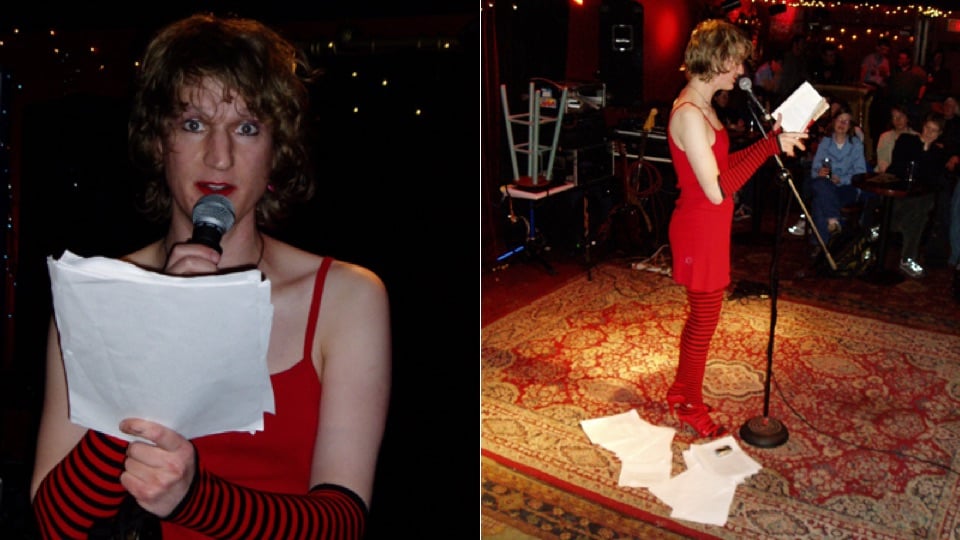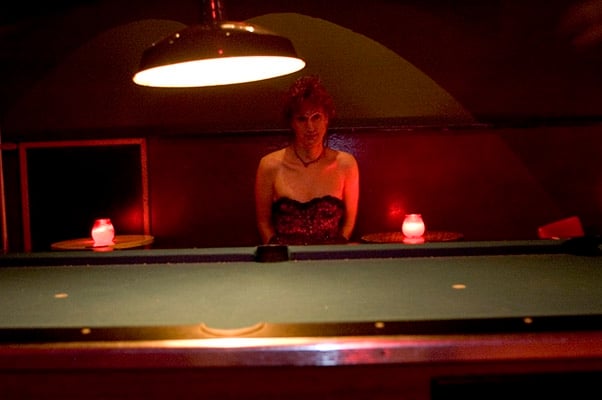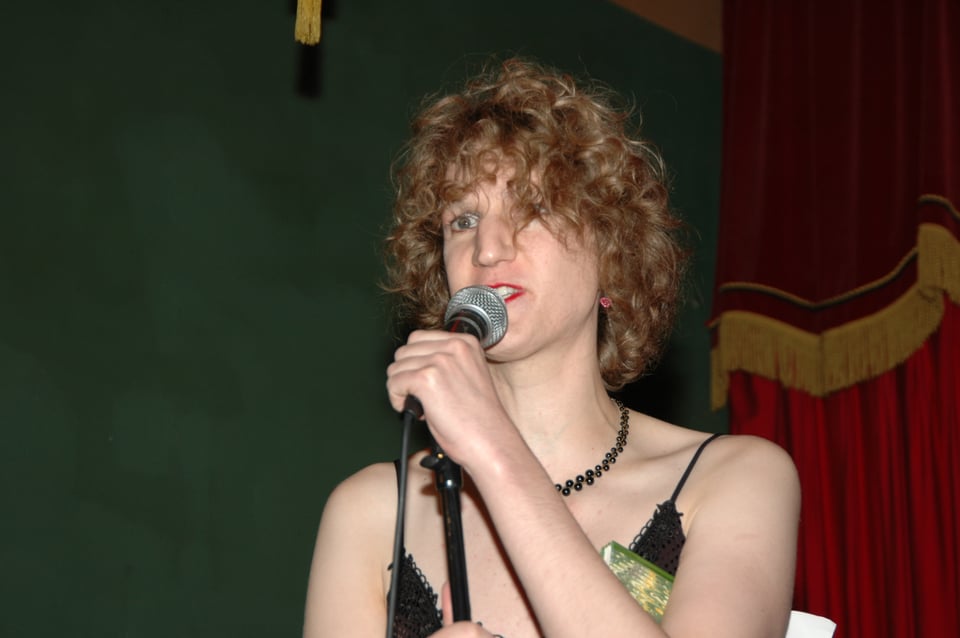I Took a Break from Being Publicly Trans. Then I Came Back Stronger.
Thanks for reading my newsletter! I have a novel coming out called Lessons in Magic and Disaster (pre-order link). It’s about a trans witch who teaches her mother how to do magic, and about a mysterious novel from 1749 that holds secrets about an 18th century scandal. But really it’s about healing and unconditional love, and rediscovering desire in the midst of grief. If you pre-order it, you can get the first several chapters the sequel to All the Birds in the Sky in your inbox — details here.
Why I Stopped Talking About Being Trans
Today is the Trans Day of Visibility, so I thought I would talk about a time in my life when I decided to be less visible as a trans person — and particularly as a trans writer. I actually announced at the time that I was doing this.
Sometime in 2007, I was part of a queer literary panel at the Harvey Milk Library in the heart of the Castro District in San Francisco. And in the middle of that conversation, I told the audience that I was going to step back from writing trans and queer fiction, and I might quit identifying myself as a “trans author,” rather than just “an author who is trans.”
I remember the temperature in the room dropped a bit, and everyone stared as if I’d just eaten a bug. You’re probably not supposed to announce at a queer lit event that you are kind of done with being a queer author.
I felt kind of guilty about this for a long time. But in recent years, I’ve come to realize that I was severely burned out. I needed a change, and I needed to reinvent myself and try something different for a while. If I hadn’t taken that pause, I wouldn’t be able to do all the trans-centric writing I’m doing now. There would be no Elza, no Escapade, no Jamie from Lessons in Magic and Disaster. No “Don’t Press Charges.” There would definitely be no Trans Nerd Meet Up. So now I’m grateful to Past Charlie Jane for making that choice.
When I made that impromptu announcement at that Harvey Milk Library panel, I’d spent several years as a trans author. I’d written sixty or seventy short stories about queer and trans characters — some of them published as erotica, others as litfic or science fiction. I’d also written dozens of personal essays and non-fiction pieces about trans topics. And I had published a gonzo genderqueer coming-of-age novel called Choir Boy which had won the Lambda Literary Award for trans/genderqueer writing. (I have no idea how that novel holds up now, but it was my attempt to tell a trans story that was wildly different from the ones I was reading at the time.)
I had gotten to be part of a lot of queer literary events and scenes, and had learned so much about writing and performing from some incredible writers and poets. I was a regular performer at Gender Enders, Gender Pirates, the Gender Crash Open Mic and other events — here’s a San Francisco Chronicle article from 2003 about the trans performance scene that I’m quoted in.
After Choir Boy came out, instead of doing a typical book tour, I helped organize a nationwide tour of trans authors called the Cross Gender Caravan. We stopped in New York and other big cities, but also places like Montpelier, Albany and Olympia. It was a wild adventure, sleeping on people’s floors (sometimes under a spinner rack full of moldy zines) and sitting in a car all day blasting death metal. We blew into town, read our trans stories, and then vanished into the night.

To help fund this excursion, we also took some speaking gigs on college campuses, where we found ourselves kind of speaking for the trans community, and at times having to teach Trans 101, something I never felt qualified to do. (On one campus visit, during the Q&A, a man asked why the trans women on the panel were so tall. I responded that we hadn’t gotten the height reduction surgery yet.)
I realized that was one career path I could have: I could travel around speaking about being trans and helping to educate people, but I never felt like the right person for the job. Visiting small and midsize towns as part of a trans tour, too, started to feel overwhelming at a time when there were way fewer trans people in public life. And at pretty much every tour stop, I would get messages online from trans women who dearly wanted to attend but were scared to show their faces at something that’d been advertised as a trans event. I always tried to convince them that it would be okay, we’d have a good time, but of course I couldn’t promise total safety. We seldom had more than one or two trans women at any of our tour stops.
Mostly, I had the sense that being a trans author in 2005 or 2006 meant representing the trans community to the public, when I was a loopy weirdo who just wanted to make silly jokes and wear matching stripey arm warmers and tights. I knew plenty of people, like Julia Serano and Imani Henry, who were really good at that work. (I also felt like one problem the trans community had was too many white folks claiming to speak for all trans people.)

The experience of publishing a trans novel in 2005, especially one that didn’t play into people’s expectations, was intense as well. Only two major outlets reviewed Choir Boy, and one of them started their review by pointing out that I had lots of experience with being a freak, but not much with writing novels. (Which was true, but still!) The queer literary establishment was dominated by white cis gays, who regularly misgendered me in public. (After I won the Lambda Literary Award, a man approached me at a reception and asked me to be on a jury for another queer award, and I said I thought I could. The man said this was great news — because the jury was all women so far, and they needed a man. To be clear, this was immediately after I’d just won an award for trans fiction.)
Also, the mid-2000s were a brutal time for queer publishing. Every conversation I had with another queer author in 2006 was about how the magazines and small presses that used to put out their work were disappearing or pivoting toward “mainstream” straight content, and people suddenly couldn’t get published at all. The trans performance scene that the Chronicle wrote about in 2003 had fallen apart, and people were kind of drifting away.
One other thing that happened was that I tried to advocate for trans inclusion with a couple of local queer organizations. In particular, there was a group for bisexual women in the Bay Area, which had policies excluding trans women. (Similar to those at the Michigan Womyn’s Music Festival at the time.) Since this was by far the most prominent bi organization at the time, and they’d had the only bi float in the Pride Parade that year, I decided to raise a fuss. And… it got ugly. A lot of TERFy rhetoric was thrown around. I was at a Trans Law Center fundraiser and some older trans women cornered me and told me that I was making too much noise, and it was better for the trans community if we picked our battles. Or words to that effect.
I had lunch with Kate Bornstein some time after that, and poured out my heart about everything that had happened, with tears in my eyes. I didn’t think I could keep doing trans advocacy and also concentrate enough to work on my fiction. I felt like my creative spark was being extinguished by being drawn into these battles. Kate gave me the kindest, gentlest smile and told me that the path of the artist and the activist don’t always converge.

But mostly, I had been writing and talking and thinking about transness, and I felt like I was starting to repeat myself. A lot of people were talking at the time about how marginalized people get pressured to perform their identities for the world, and that struck a chord with me. I had used fiction and essays to navigate my transition and find how I could exist in the world, and it had been a mostly joyful experience of raw creativity. I had used creative writing to explore and dismantle all of the ideas I had about gender, sexuality, embodiment and being yourself in a world that never makes sense. I’d gone heavily into queer lit and erotica, and now? I wanted to write some weird-ass science fiction about blob people and toilet monsters for a while. (Around this time, I was writing the novel that became my novella Rock Manning Goes For Broke, and could not figure out how to make any of the major characters trans.)
Some time after I dropped a bomb at the Harvey Milk Library, I got a job blogging about science fiction at io9, where I shared my controversial opinions about Star Trek and got shouted at by random nerds. At this point, plenty of people hated me because I had said mean things about Tron Legacy, and I didn’t always need to give them other reasons to hate me. I was honestly nervous enough about going to Comic Con and Hollywood junkets to interview random celebrities in my nicest thrift store dresses.
I never stopped being out, of course. You could find out I was trans if you searched for thirty seconds. I kept doing trans events here and there, and I would make jokes about being trans on stage at Writers With Drinks on a regular basis. I was still including trans characters in my fiction. Anyone who met me could probably tell right away. I just wasn’t making “trans writer” my identity as much.
And then during and especially after the 2016 election, when trans rights were suddenly becoming a major political issue, I started to realize I had a much bigger platform than I’d had back in 2007, especially after All the Birds in the Sky. I could do a lot of good by talking publicly about being trans and letting the world know that trans people aren’t going anywhere. I also realized, to my delight, that I had things to say about transness once again. All the excitement I’d felt in 2001 about writing trans stories and exploring what it meant to be trans came roaring back — except that now, there were more trans people writing more trans stories, and there wasn’t just one true “trans story” that most people were willing to accept. I had so many other people’s art and writing to be inspired by. I wasn’t ever the only trans woman in the room, and nobody expected me to be the spokesperson for the whole trans community. I was so happy to be back. Everything felt brand new, but also as though I’d never really left.
I loved being a queer writer in the 2000s — getting to unpack all of my baggage around embodiment and selfhood, but also getting to be part of a vibrant and rich community. It was one of the coolest things I’ll ever be part of, and one of the happiest times in my life. I love it even more these days, when we’re awash in trans art and writing that is bold and colorful and new. I’m learning so much and exploring so much.
So I no longer feel bad that I needed to take a break. I’m proud of the work that I’ve done lately, and I know I wouldn’t have been able to do it if I hadn’t taken some time to do other stuff. I also know now that there are many ways to be visible and to show up for your community, some of which don’t involve raising your voice or making yourself the centerpiece. So if you’re feeling burned out like I was, and you need to step back? Step back. We can carry on without you for a while, and we’ll welcome you back with open arms when you return.
